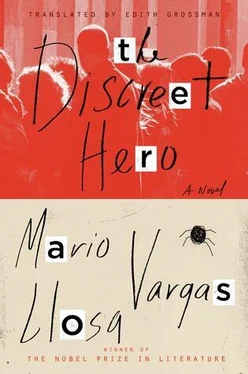“Why are you crying, señor?” Fonchito dared to ask him.
“Edilberto Torres was crying there too, in the bathroom of a discotheque?” Rigoberto gave a start. “Like on the day you saw him sitting beside you at the Larcomar Cineplex?”
“At the movies I saw him in the dark and I might have been wrong,” Fonchito responded with no hesitation. “Not in the bathroom at the discotheque. There was enough light. He was crying. Tears came out of his eyes and ran down his face. It was … it was … I don’t know how to say it, Papa, it was sad, really sad, I swear. Seeing him cry in silence, not saying anything, looking at me with so much sorrow. He seemed to be suffering so much and it made me feel bad.”
“Excuse me, but I have to go, señor,” Fonchito stammered. “My friend Chato Pezzuolo is waiting for me outside. I don’t know how to tell you how it makes me feel to see you like this, señor.”
“In other words, as you can see, Pepín, this isn’t a joke,” Rigoberto concluded. “Is he telling us the whole story? Is he delirious? Is he hallucinating? Except for this, the boy seems very normal when he talks about other things. This month his grades in school have been just as good as usual. Lucrecia and I don’t know what to think anymore. Is he losing his mind? Is this an adolescent crisis of nerves, something that will pass? Does he just want to frighten us and have us worry about him? That’s why I’ve come, old man, that’s why we thought of you. I’d be so grateful if you could help us. It was Lucrecia’s idea, as I said: ‘Father O’Donovan might be the solution.’ She’s a believer, as you know.”
“Yes, naturally, of course I will, Rigoberto,” his friend reassured him again. “As long as he agrees to talk to me. That’s my only condition. I can see him at your house, or he can come here to the church. Or I can meet him somewhere else. Any day this week. I realize now that this is very important to both of you. I promise to do everything I can. The only thing, really, is that you not force him. Suggest it to him and let him decide whether he wants to talk to me.”
“If you get me out of this, I’ll even convert, Pepín.”
“Not on your life,” said Father O’Donovan, making the sign of vade retro . “We don’t want sinners as refined as you in the Church, Ears.”
They didn’t know how to bring up the subject with Fonchito. It was Lucrecia who had the courage to speak to him. The boy was somewhat unnerved at first and took it as a joke. “But what do you mean, Stepmother, isn’t my papa an agnostic? Was it his idea for me to talk to a priest? Does he want me to confess?” She explained that Father O’Donovan was a very experienced man and a very wise person whether he was a clergyman or not. “And if he persuades me to enter a seminary and become a priest, what will you and my papa say then?” the boy continued to joke.
“Absolutely not, Fonchito, don’t say that even to be funny. You, a priest? God save us!”
The boy agreed, as he’d agreed to see Dr. Delmira Céspedes, and said he preferred to go to the church in Bajo el Puente. Rigoberto drove him in his car. He dropped him off and went to pick him up a couple of hours later.
“He’s a very nice guy, your friend,” was all Fonchito would say.
“In other words, the conversation was worthwhile?” Rigoberto explored the terrain.
“It was very good, Papa. That was a great idea. I learned a lot of things talking to Father O’Donovan. He doesn’t seem like a priest, he doesn’t give advice, he listens. You were right.”
But he refused to say any more either to him or to his stepmother in spite of their requests. He limited himself to generalities, like the smell of cat urine that filled the church (“Didn’t you notice, Papa?”) even though the priest assured him he didn’t have and had never had a cat and, in fact, saw mice in the sacristy from time to time.
Rigoberto soon deduced that something strange, perhaps something serious, had occurred during the couple of hours that Pepín and Fonchito talked. Otherwise, why had Father O’Donovan been avoiding him for the past four days, making up all kinds of excuses, as if he were afraid to meet with him and tell him about his conversation with the boy?
“Are you looking for reasons not to tell me how your conversation with Fonchito went?” He confronted him on the fifth day, when the priest deigned to answer the telephone.
There was a silence of several seconds on the phone, and finally Rigoberto heard the priest say something that left him stupefied.
“Yes, Rigoberto. The truth is, I am. I’ve been avoiding you. What I have to tell you is something you’re not expecting,” Father O’Donovan said mysteriously. “But since it can’t be helped, let’s talk about it. I’ll come to your house for lunch on Saturday or Sunday. Which day is better for you?”
“Saturday, Fonchito usually has lunch that day at his friend Pezzuolo’s house,” said Rigoberto. “What you’ve said will keep me awake until Saturday, Pepín. And it’ll be even worse for Lucrecia.”
“That’s how I’ve been since you had the bright idea of having me talk to your son,” the priest said drily. “Until Saturday then, Ears.”
Father O’Donovan must have been the only cleric who traveled through greater Lima not by bus or jitney but on a bicycle. He said it was his only exercise, but he did it so regularly that it kept him in excellent physical condition. Besides, he liked to pedal. He would think as he rode, preparing his sermons, composing letters, scheduling the day’s tasks. True, he had to be constantly on the alert, especially at intersections and at the traffic lights that no one in this city respected, and where motorists drove as if trying to knock down pedestrians and cyclists instead of bringing their vehicle safely home. Even so, he’d been lucky: In the more than twenty years that he’d been traveling all over the city on two wheels, he’d been hit only once, with no serious consequences, and only one bicycle had been stolen. An excellent record!
On Saturday, at about midday, Rigoberto and Lucrecia, who were watching the street from the terrace of the penthouse where they lived, saw Father O’Donovan pedaling furiously along the Paul Harris Seawalk in Barranco. They felt great relief. It had seemed so strange that the cleric put off telling them about his conversation with Fonchito for so long that they had even worried he’d invent a last-minute excuse to avoid coming. What could have been said in the conversation to make him so reluctant to tell them about it?
Justiniana went downstairs to tell the porter to allow Father O’Donovan to bring his bicycle into the building to keep it safe from thieves, and rode up with him in the elevator. Pepín embraced Rigoberto, kissed Lucrecia on the cheek, and asked permission to go to the bathroom to wash his hands and face because he was sweaty.
“How long did it take you to cycle from Bajo el Puente?” asked Lucrecia.
“Just under half an hour,” he said. “With the traffic jams we have now in Lima, it’s faster to go on a bicycle than in a car.”
He asked for fruit juice as an aperitif and looked at both of them slowly, smiling.
“I know you must have been saying terrible things about me for not telling you what happened,” he said.
“Yes, Pepín, exactly, terrible, awful, dreadful things. You know how upset we are about this. You’re a sadist.”
“How was it?” Doña Lucrecia asked anxiously. “Did he talk to you honestly? Did he tell you everything? What’s your opinion?”
Father O’Donovan, very serious now, took a deep breath. He murmured that the half hour of pedaling had tired him more than he cared to admit. And he was silent for a long time.
Читать дальше

![Гарри Гаррисон - Bill, the Galactic Hero [= The Starsloggers]](/books/87536/garri-garrison-bill-the-galactic-hero-the-star-thumb.webp)










